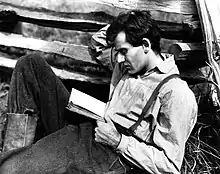Young Mr. Lincoln
Young Mr. Lincoln is a 1939 American biographical drama film about the early life of President Abraham Lincoln, directed by John Ford and starring Henry Fonda.[1][2] Ford and producer Darryl F. Zanuck fought for control of the film, to the point where Ford destroyed unwanted takes for fear the studio would use them in the film. Screenwriter Lamar Trotti was nominated for an Academy Award for Best Writing/Original Story.
| Young Mr. Lincoln | |
|---|---|
.jpg.webp) Theatrical release poster | |
| Directed by | John Ford |
| Produced by | Darryl F. Zanuck Kenneth Macgowan |
| Written by | Lamar Trotti |
| Starring | Henry Fonda Alice Brady Marjorie Weaver Arleen Whelan |
| Music by | Alfred Newman |
| Cinematography | Bert Glennon Arthur C. Miller |
| Edited by | Walter Thompson |
Production company | |
| Distributed by | 20th Century Fox |
Release date |
|
Running time | 100 min. |
| Language | English |
| Budget | $1,500,000 (estimated) |
In 2003, Young Mr. Lincoln was selected for preservation in the United States National Film Registry by the Library of Congress as being "culturally, historically, or aesthetically significant".
Plot
In 1832, a family traveling through New Salem, Illinois in its wagon need groceries from Lincoln's (Henry Fonda) store, and the only thing of value that they have to trade is a barrel of old books including a law book, Blackstone's Commentaries. After thoroughly reading the book, Lincoln opts for the law after receiving encouragement from his early, ill-fated love, Ann Rutledge (Pauline Moore), who soon dies. Too poor to own even a horse, he arrives in Springfield, Illinois, on a mule and soon establishes a law practice in 1837 with his friend John Stuart (Edwin Maxwell). After a raucous, day-long Independence Day celebration, a man, Skrub White, is killed after he pulled a gun in a fight. The accused are two brothers, Matt and Adam Clay (Richard Cromwell and Eddie Quillan). Lincoln prevents the lynching of the accused at the jail by shaming the angry, drunken mob. He also convinces it that he really needs the clients for his first real case.
Admiring his courage, Mary Todd (Marjorie Weaver) invites Lincoln to her sister's soiree. Despite being aggressively courted by the very polished Stephen Douglas (Milburn Stone), Mary is interested in Lincoln. She faithfully attends the trial of the Clay boys, sits in the front row, and listens closely.
The boys' mother, Abigail Clay (Alice Brady), who witnessed the end of the fight, and Lincoln are pressured by the prosecutor (Donald Meek) to save one of the brothers at the expense of the other's conviction. However, the key witness to the crime, J. Palmer Cass (Ward Bond), is a friend of the victim who claims to have seen the murder at a distance of about 100 yards under the light of the moon: "It was moon bright." However, Lincoln persists and is able, by using an almanac, to demonstrate that on the night in question, the moon had set before the time of death. He then drives Cass to confess that he had actually stabbed his friend.
Cast
- Henry Fonda as Abraham Lincoln
- Alice Brady as Abigail Clay (final film role)
- Marjorie Weaver as Mary Todd
- Arleen Whelan as Sarah Clay
- Eddie Collins as Efe Turner
- Pauline Moore as Ann Rutledge
- Richard Cromwell as Matt Clay
- Donald Meek as Prosecutor John Felder
- Dorris Bowdon as Carrie Sue (Judith Dickens, who was obviously replaced by Bowden, is falsely credited)[3]
- Eddie Quillan as Adam Clay
- Spencer Charters as Judge Herbert A. Bell
- Ward Bond as John Palmer Cass
- Milburn Stone as Stephen A. Douglas
- Cliff Clark as Sheriff Gil Billings
Background
The film has as its basis the murder case against William "Duff" Armstrong, which took place in 1858 at the courthouse in Beardstown, Illinois, the only courthouse in which Lincoln practiced law that is still in use.
It is referred to as the "Almanac Trial" on Armstrong's grave,[4] and Lincoln proved the witness against the accused was lying about being able to see by the light of the moon, using an almanac. Armstrong was acquitted. That is the closest element of reality referenced in the film.
Adaptations
Young Mr. Lincoln was adapted as a radio play on the July 10, 1946 episode of Academy Award Theater.[5]
The Village Theatre of Everett and Issaquah, Washington has commissioned a new musical based on the film titled Lincoln in Love, book and lyrics by Peter S. Kellogg and music by David Friedman.
See also
- List of films with a 100% rating on Rotten Tomatoes, a film review aggregator website
References
- Variety film review; June 7, 1939, page 12.
- Harrison's Reports film review; June 17, 1939, page 94.
- Gallagher, Tag (20 April 1988). John Ford: The Man and His Films. ISBN 9780520063341.
- "William Duff Armstrong - Find a Grave". Retrieved 2019-02-10.
- Academy Award Theater archives at the Internet Archive
External links
| Wikiquote has quotations related to: Young Mr. Lincoln |
